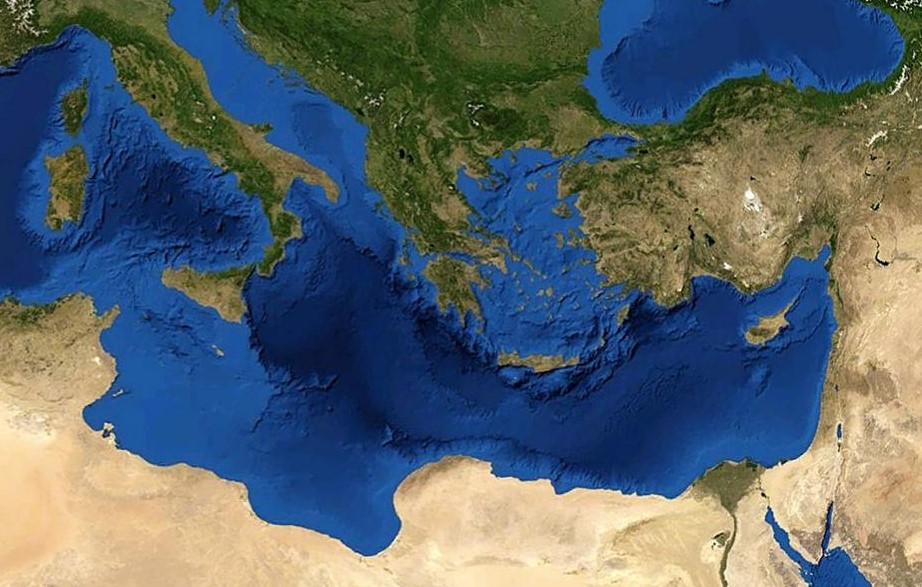Greece: America’s New Key Strategic Partner
 Tectonic shifts are underway in the Eastern Mediterranean. Some pose growing threats to American interests and allies, others offer new prospects for stability and prosperity. Washington now must develop a coherent regional strategy that addresses these challenges and capitalizes on these opportunities.
Tectonic shifts are underway in the Eastern Mediterranean. Some pose growing threats to American interests and allies, others offer new prospects for stability and prosperity. Washington now must develop a coherent regional strategy that addresses these challenges and capitalizes on these opportunities.
The primary driver of change in the region has been Turkey’s aggressive strategic posture. Once a reliable U.S. ally, Turkey under President Erdoğan increasingly diverges from, and often directly opposes, American interests. This is by no means limited to the Eastern Mediterranean, but it is particularly acute here.
Ideologically aligned with the Muslim Brotherhood, Erdoğan sought unsuccessfully during and after the 2011 Arab upheavals to build a Muslim Brotherhood sphere of influence in Egypt and elsewhere. Erdogan allowed jihadists to flood Syria and refugees to flee into Europe. He has attacked our Kurdish allies in Syria and even threatened the lives of American soldiers fighting alongside them against ISIS.
Also, Turkey has severed its longstanding strategic link to Israel that helped form the bedrock of regional stability. It actively works to undermine Israel’s security, supporting radical Islamist groups in Syria, Gaza, Egypt and Libya. It is also moving closer to Moscow—including agreeing to buy advanced Russian S-400 air defense systems—and Tehran, while becoming more antagonistic toward Greece in the Aegean Sea and Egypt and Cyprus in the Mediterranean.
Simultaneously, Russian and Iranian inroads are bringing great power competition to the Eastern Mediterranean. During the Cold War, the Soviet Union did not challenge America’s naval superiority here. But President Putin is using Russia’s permanent naval base in Syria to do just that, as well as establishing an anti-access/air denial exclusion zone covering much of the region. The Eastern Mediterranean is no longer uncontested operating environments for the U.S. military.
Iran now effectively has a Mediterranean beachhead, too. Its forces, allies and proxies control much of Syria, where it also just leased a strategically vital port. Through Hezbollah, it dominates Lebanon’s government and can threaten adjacent sea lanes and energy platforms with anti-ship missiles. While the interests of Iran, Turkey and Russia do not fully align, they appear increasingly unified in their anti-Americanapproach to the region.
There are, however, some notable positive developments in the Eastern Mediterranean. The region boasts bountiful new offshore natural gas discoveries, which Israel, Greece and Egypt are already developing. They are enabling closer relations between Israel, Egypt and Jordan, and could eventually reduce European dependence upon Russian gas.
Further, the above threats are prompting rapid realignments of states that traditionally had little in common. Greece has been the driving force – perhaps surprisingly, as its recent history is troubled by economic collapse and tensions with NATO over the Balkans.
But Greece is exploiting these seismic changes adroitly, as we learned from recently meeting with high-level security and opposition leaders there. Greece is growing into NATO’s new southeastern bulwark, enthusiastically hosting alliance exercises and making its naval base on Crete available to the United States. Greece is also taking the diplomatic lead in creating new forums to deepen regional cooperation with Cyprus, Egypt and Israel. Ties with Israel have grown particularly rapidly, especially considering Greece’s historical antipathy to the Jewish state. Its strategic value to the United States has risen commensurably.
Greece’s turnaround is all the more remarkable for being led by former Communist Alexis Tsipras, whose strategic acumen clearly has been underestimated. And even if Tsipras loses power in this year’s elections, as looks likely, his initiatives are sure to be sustained by the center-right New Democracy Party, which traditionally is more pro-American.
Yet America does not seem to possess a coherent strategy for the Eastern Mediterranean. Certainly, Secretary Pompeo’s public support earlier this year for a trilateral Hellenic Forum among Greek, Cypriot and Israeli leaders signaled U.S. recognition of the region’s evolving geopolitics.
But this must be followed by more concerted U.S.-led efforts. This includes a strategy to push back hard against Erdoğan’s excesses, including reducing our military presence in Turkey while keeping open the possibility of restoring the U.S.-Turkish strategic relationship if Ankara returns to a more secular, democratic and Western orientation. It will also require more robust American air and naval presence in the Eastern Mediterranean, including deeper cooperation with Greece.
The Pentagon and State Department also need to bridge their bureaucratic divides, which bifurcate the region between Europe desks focused on Russia and Ukraine and Middle East desks tied up with Iraq, Iran and Syria. Under the current structure, regional developments remain peripheral concerns for everyone involved.
For the first time in decades, the Eastern Mediterranean beckons with serious challenges and opportunities. American policymakers now need to turn greater attention to these developing flashpoints, both to mitigate the drivers of potential conflict and foster deeper cooperation that can benefit the United States.
Michael Makovsky, a former Pentagon official in the George W. Bush administration, is president and CEO of the Jewish Institute for National Security of America (JINSA). Gen. (ret.) Charles Wald, former deputy commander of U.S. European Command, is a Distinguished Fellow at JINSA’s Gemunder Center for Defense and Strategy.
Originally appeared in Newsweek
This op-ed was made possible by the generous support of the Gettler Family Foundation and a portion of the research was conducted on the Benjamin Gettler International Policy Trip.